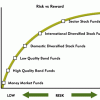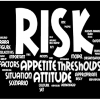Clouds of Vagueness
Featured

Antifragility
Antifragility is the topic of Nassim Nicholas Taleb’s last book in his trilogy on our uncertain world and how to deal with it. The other two were Fooled by Randomness and The Black Swan. These are both relatively narrow in their scope – though well worth their own reviews at some point – whilst Antifragility gives […]

Risk workshops
I was talking to a colleague the other day who dismissed risk workshops in a rather peremptory way. He painted a picture of a pompous facilitator locked up in a room with 20 or so bored people with better things to do. “In any case we know all the risks and we can always review […]

Fools and liars
My ears are burning (metaphorically). I’ve just read Bent Flyvbjerg’s paper on quality control and due diligence in project management. His theme is the inaccuracy in forecast project costs and benefits. Specifically, the tendency to underestimate costs and overestimate benefits is attributed to the ‘planning fallacy’, a creation of our old friends Tversky, Kahneman and co. The source of […]

Risk registers, bloody risk registers
It all sounds so simple. Just make a list of all the risks. Then you can start figuring out how to prioritise them and manage them in a comprehensive and visible way. Job done. This was how it seemed back in the early 90s when we took some tools that had proven quite effective for the management of […]

The profession that knows it all
The theme which underpins Clouds of Vagueness is the inherent difficulty of mastering an uncertain future and the inadequacy of our standard risk management techniques to help with this. So I was delighted to see the paper by Michael Power of the LSE in the journal Accounting, Organisations and Society, with the provocative title The risk management of […]

Risk appetite – a bad idea
It’s a truism that you can’t do anything – or even nothing – without taking risk. This is an important issue for all organisations, but the discussion of what risk to take has become unnecessarily obscured. Specifically it has become bogged down in the unhelpful concept of ‘risk appetite’ and this has added to the […]

Organisational risk taking – a simple view
At the core of organisational risk management lies the question of what risks to run. You know the organisation cannot achieve its purpose with certainty. You know you can take steps to control risk – to some extent. You know that your chance of success will be improved if you seek out and grasp opportunities. And you think […]

The RARA model – how relevant to organisations?
A very useful model for thinking about risk taking has been created by David Hillson and Ruth Murray-Webster. In contrast to the IRM guidance it is rigorous and well thought through. The model consists of an influence diagram in which the nodes and influences have been well-defined. Thus the model makes an interesting and valuable contribution to the risk […]

The IRM on risk appetite – whatever does it mean?
The IRM has been inspired to issue guidance on risk appetite and risk tolerance. It’s very questionable though whether this helps us make much progress on organisational risk taking. Like many articles on risk matters it gets bogged down in a morass of vaguely relevant ideas so illiterately and unrigorously described that many sections are devoid […]

Where did the BBC go wrong?
It is a truth universally acknowledged that having some kind of ‘best practice’ (enterprise) risk management system will keep you out of trouble. Well, it is if you read the standard risk management stuff, books on reputational risk management and the like. But as the BBC’s reputation stands in tatters it’s worth asking what went wrong. Is it the […]